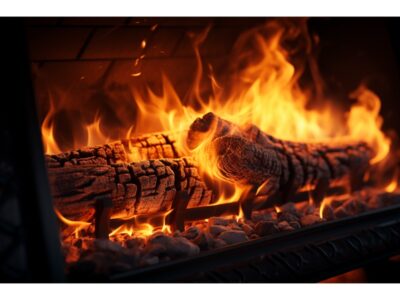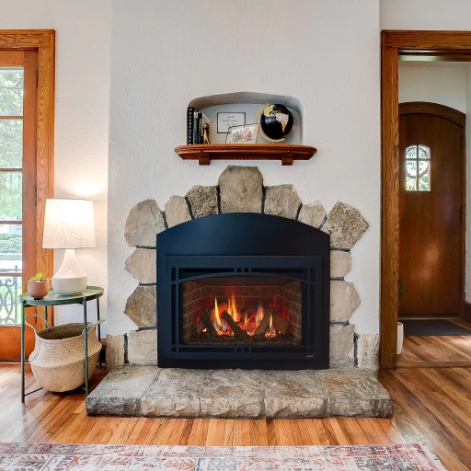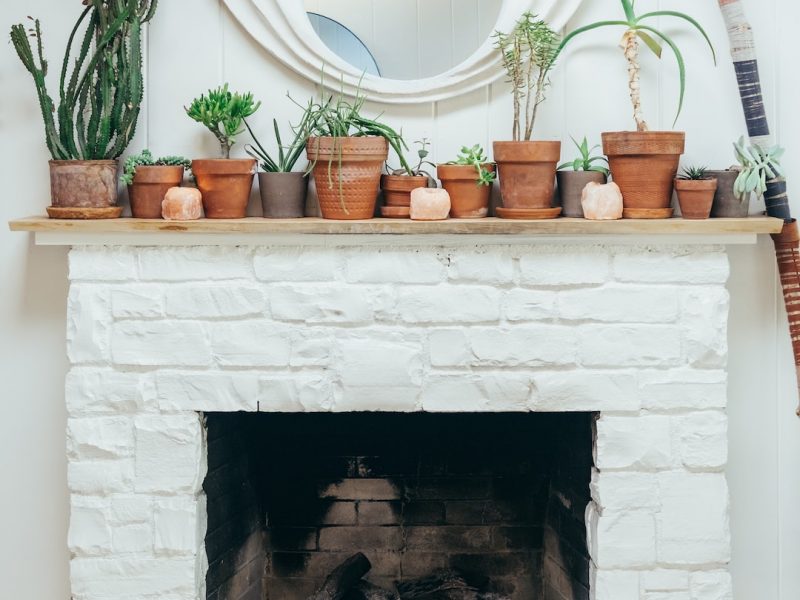Table of Contents
- 1 1. Remove Creosote Buildup
- 2 2. Close the Damper When Your Fireplace Isn’t Being Used
- 3 3. Check Your Chimney for Animals
- 4 4. Install a Chimney Cap
- 5 5. Remove Tree Branches Over Your Chimney
- 6 6. Add Charcoal to Your Firebox
- 7 7. Install a Fireplace Door
- 8 8. Use a Fireplace Deodorant
- 9 9. Use an Air Purifier
- 10 Getting Rid of a Fireplace Smell
A warm fire in your living room or den adds ambiance to the space. However, the lingering smell of ashes and soot does not.
Sometimes, the fireplace smell intensifies if the flue is dirty or moisture gets in. There’s no question that this unpleasant, smoky odor is most common on rainy days and humid months.
You may wonder what steps you can take to fight that “fireplace stink” in your home. The good news is that there are more than a few ways to get rid of the odor and prevent it from returning.
Keep reading to learn what these methods are.
1. Remove Creosote Buildup
Creosote is a chemical created when you burn wood. Creosote is produced from the smoke your fire creates.
As smoke rises from your fire, creosote can become stuck inside your chimney. It can quickly transition from gas to solid form, especially when temperatures drop.
When you continue using your fireplace, more and more creosote collects in your chimney. The biggest danger to this is that creosote is extremely flammable.
If the creosote builds up in your chimney happens to ignite, it may cause a fire and spread throughout your house. Also, creosote can cause health issues.
Even though creosote may seem scary, it’s normal. It happens any time you burn wood for your fire. You can prevent hazards and health issues by hiring a professional to provide annual chimney cleanings and inspections.
2. Close the Damper When Your Fireplace Isn’t Being Used
Air pressure greatly impacts the fireplace odors you smell during and after using your fireplace.
Your home has multiple vents allowing air outside your house. For example, kitchens and bathrooms include vents that release fumes and smells from your living areas.
The issue with this is when the air exits your home, it leads to negative air pressure inside your home. This means the air pressure inside becomes much lower than the air pressure outside.
At this point, the high-pressure air (from outside) will flow into the area with low-pressure (inside) to reach a balance.
One entry point for high-pressure air is the chimney. As the air moves through the chimney, it carries the creosote and smoke smell.
You can easily reduce and even eliminate this smell by closing the damper when you aren’t using the fireplace.
3. Check Your Chimney for Animals
Another common cause of home odor caused by your fireplace is pests. It doesn’t matter if they are dead or alive; when an animal is in your chimney, it can cause a bad smell.
Just like with creosote, negative air pressure will worsen the issue as the airflow carries the “stink” of the unwanted housemate throughout your home.
Investing in professional inspections and cleaning will ensure that these unwanted guests are removed and that the odor is eliminated.
4. Install a Chimney Cap
When it rains, the water may get inside the chimney. If this happens, it will mix with the creosote, which creates an unpleasant musty odor.
Besides that, too much moisture can start to impact the chimney’s structural integrity. Higher amounts of moisture may also result in the creosote sticking more securely to the interior of your chimney.
While getting rid of moisture is challenging, it’s not impossible.
Installing a chimney cap can help prevent moisture from getting into your chimney to keep this problem from happening again.
5. Remove Tree Branches Over Your Chimney
A little-known cause of bad smells from your chimney is tree debris. If there are tree branches over your chimney and no cover, there’s nothing that will keep trees from dropping twigs, leaves, and other debris into the chimney.
While this may seem harmless, tree branches and leaves can cause bad odors when they start to break down and rot.
Like other smells, it gets worse when it is carried through your chimney and into your home because of negative air pressure.
Go outside and see if there are any tree branches over your chimney. If so, have them removed to prevent these issues.
6. Add Charcoal to Your Firebox
When it comes to fireplace tips to remove odors, charcoal is a proven one. Charcoal is known for neutralizing odors which makes it an effective way to eliminate any smell from your chimney.
Place a bucket of charcoal in your firebox to eliminate chimney odors. An alternative to this is kitty litter, which will have the same effect.
7. Install a Fireplace Door
Like a fireplace damper, installing a glass door can help to prevent drafts that would bring outside smells into your home. If you have the door closed, it will keep drafts from entering your home and keep the bad smells out.
You can also close the glass doors when you are using the fireplace. This can keep the smokey odor from entering your home.
Smoke is one of the hardest odors to get out of your furniture, so it’s best to prevent it.
8. Use a Fireplace Deodorant
After you take steps to eliminate the cause of your fireplace odors, you may notice the ash and soot smell linger. This happens when it soaks into the porous brick and mortar.
You can use a fireplace deodorant to eliminate the odor. Put the bottle on your smoke shelf and pull the wick up. This should provide a few months of freshness.
9. Use an Air Purifier
A portable air purifier can help remove all odors from the air. Put one close to your fireplace and let it get to work.
Just be sure you use a model that won’t produce ozone as a byproduct.
Getting Rid of a Fireplace Smell
As you can see, more than a few issues can lead to a fireplace smell. However, there are also methods to get rid of them all.
Are you ready to move forward and have a modern fireplace installed in your home? If so, contact us today to discuss your preferences and budget. We will help you get the fireplace you have always dreamed of.
Latest Articles

Can I Have A Fireplace In My Sunroom?
Table of Contents1 Pros and Cons of Having a Fireplace in a Sunroom2 Types of Fireplaces for Sunrooms3 Factors to Consider Before Installing a Fireplace

Why Is My Garage Door Opener Opening Both Doors?
Table of Contents1 Understanding Garage Door Openers2 Common Issues with Garage Door Openers3 Why Is My Garage Door Opener Opening Both Doors?4 How to Troubleshoot

Is It Normal For Sparks To Come Out Of Chimney?
Table of Contents1 What Are Sparks in a Chimney?2 What Are the Dangers of Sparks in a Chimney?3 How to Prevent Sparks from Coming Out




















































































